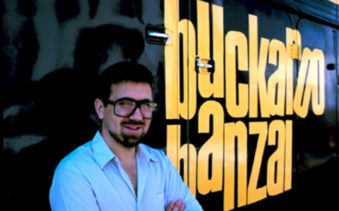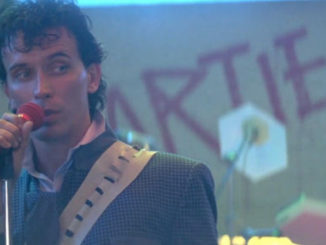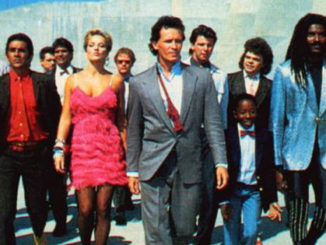When first released in August 1984, The Adventures Of Buckaroo Banzai: Across The Eighth Dimension did not make much of a splash. Coming from a studio who was unsure how to market the film’s offbeat New Wave mix of science-fiction, adventure and comedy and audiences – The ones that made it to the theaters, at least – weren’t sure how to respond. But the advent of the home video boom gave the film an unexpected new life, rising it to be considered as one of the great films of the 1980s. Thirty-two years and a recent blu-ray release with a fairly comprehensive documentary about the film later, director W. D. Richter is still happy to discuss Buckaroo Banzai, stating “It’s fun to talk about this movie because it means a lot to a lot of people. It meant a lot to us while we were making it.” In this first installment of our multipart interview with the director, we talk with Richter about his journey to filmmaking, how he met Buckaroo Banzai screenriter Earl Mac Rauch and the early days of hearing from Rauch about a character named Buckaroo Bandy who would star in a “country western, action adventure serial with science-fiction elements” he wanted to write about…
Q – Did you ever imagine that 32 years later you would still be having opportunities to talk about Buckaroo Banzai?
WDR – Of course not. I mean, it’s just astounding to me. I don’t know really what to say other than that we all made this thing kind of recklessly and fearlessly and its really connected with a certain constituency. It’s really satisfying because it validates your daring. Take some chances, see what happens!
Q – Was filmmaking something you were always interested in growing up?
WDR – My grandmother used to take me to movies in Connecticut in a fairly small town that had like five movie theaters. It was an amazing time. All small towns are probably like that. We were always going to movies. She was born in Poland, so she had certain kind of American icons. She would take me to Errol Flynn movies, you know, big romantic Hollywood movies. Then as I got a little older, I got interested in horror films, and I’m not quite sure why. Maybe watching some old ones on TV. I used to go to some of those theaters by myself to watch Them and things like that that are in black and white. All those B-movies that came through town. I really was a fan of them.
When I went to college, it never occurred to me that there were film schools. It was a time when I don’t know how people thought they got in the movie business. We didn’t think about t much growing up. It seemed unreachable. You’re on the East Coast and something is happening three thousand miles away. In college, I started learning about the existence of film schools because we had some film appreciation classes, which was really unusual. That said to me you can try to do this, you don’t have to just watch it from afar. I was probably going to be an English teacher if I didn’t have that opportunity. I had no other grand design.
Q – Ultimately, was it this revelation that lead you to go out to Hollywood?
WDR – I applied to USC, UCLA and NYU. I wasn’t thinking only Hollywood. My wife and I – well, we weren’t married yet, we got married just after graduation – we took a trip to NYU and it just didn’t seem like a place where we wanted to start our lives. So I had to make a choice long distance between USC and UCLA. I was able to not make that choice until we got out there. We looked at both universities and I don’t know why I picked USC because at that time it was in a bad neighborhood and its film department was pretty ramshackle. But it appealed more.
Q- So did you and your wife meet when you were at Dartmouth or were you high school sweethearts?
WDR – Yes, you got it. We were high school sweethearts. We went steady our senior year. She applied for a teaching position in LA when we decided that’s where we’re going. At that time they actually sent recruiters across the country to east coast colleges to try and interest students graduating in education to cross the country. I’m not sure that they do that anymore. But she was able to have a job when we landed, so we had a tiny bit of financial security while I went to film school. As soon as she could, she stopped teaching and joined our company as our business manager and as my investment adviser all rolled into one.
Q – Now I know that Earl Mac Rauch was also at Dartmouth, just a few years behind you. Is that where you met or was that later?
WDR – No, but there’s an interesting possibility though. He was there one year when I was there. I was a senior and he was a freshman. Later on we discovered we both saw Arthur Penn do a Q & A after a screening of Bonnie And Clyde. Where he did it was a student lounge that didn’t have a lot of capacity. There were a reasonable number of people, maybe twenty or thirty, and we were both there! I have no idea if we sat next to each other or anything except that we were both in that room but never met.
The reason I know him at all is that my alumni magazine gave a review of his novel Arkansas Adios and it sounded wonderful. I ordered it and both Susan and I were reading it simultaneously. I said, “You’ve got to read this” and she grabbed it. It was back and forth for a week or so. I think I wrote the college to start with to find out who to get in contact with this other alum. I sent him a letter and told him if he wasn’t content with what he was doing, I thought that he had a really great shot at writing for the movie business. I had already been a story analyst at Warner right after film school and I had read hundreds of scripts. It was really kind of shocking because I had been a literature major and this was like an alternative reality of fiction. It was strange how terrible these scripts were. There were great ones for sure. But most of them seemed like writers weren’t writing them. People couldn’t construct a sentence, so I thought if Mac wants to take a shot at this, I am going to extend the offer to say “Come out and I’ll introduce you to the few people I know.” And he did, he took me up on it.
Q – Through the 1970s both of you worked on some notable films. You wrote the first remake of Invasion Of The Body Snatchers and Mac was working with Scorsese on New York, New York.
WDR – That was a difficult time for him. Mac is really not a person who likes to be in public, in meetings and interacting with groups of people. That process was difficult for him. I think Scorsese was fooling around with the script himself, and that was kind of a druggy period in LA and New York. Mac kind of withdrew from the business in a way. He did a lot of writing for producers that he never quite finished. He always second guesses himself. He would send us fantastic material on Buckaroo, we would send him a note or two and it would come back with it totally changed and a lot of great stuff lost. He did that with a lot of other producer/directors, I think. He’s just very self-critical. It’s wonderful in that way, he’s not impressed with himself at all. I am, enormously, but he isn’t at all. Then he would withdraw when somebody made the day difficult, rather than say “I’m going to beat this system!”
Q – I think it was only recently that it occurred to me that I didn’t recall seeing a picture of him anywhere until Lewis Smith (The Adventures Of Buckaroo Banzi‘s Perfect Tommy) ran one on his Facebook page.
 WDR – There’s a photo of him on the back of the hardcover of Arkansas Adios. There’s a couple online if you really search, because I’ve found some stuff and tortured him by handing them to him. When we did the blu-ray recently, I had all the transparencies from Bruce McBroom, who was the production photographer. At the end of this movie, nobody cared about the detritus of it, so I grabbed the big loose leaf of all the transparencies and I’ve guarded them over the years. We had them digitized in order for them to put some on the blu-ray. They sent me a disc and I was going through it and found that picture of Mac and thought that’s wonderful. He really does exist.
WDR – There’s a photo of him on the back of the hardcover of Arkansas Adios. There’s a couple online if you really search, because I’ve found some stuff and tortured him by handing them to him. When we did the blu-ray recently, I had all the transparencies from Bruce McBroom, who was the production photographer. At the end of this movie, nobody cared about the detritus of it, so I grabbed the big loose leaf of all the transparencies and I’ve guarded them over the years. We had them digitized in order for them to put some on the blu-ray. They sent me a disc and I was going through it and found that picture of Mac and thought that’s wonderful. He really does exist.
Q – You mentioned Mac’s numerous beginnings of Buckaroo adventures that he would abandon in favor of a new one. When did he first mention this character Buckaroo Bandy? Do you recall the actual conversation? What about it sparked your imagination?
WDR – I have this giant file I am looking at right now because we’re in a strange position with MGM about the rights issues of this movie. I’ve had to do some real digging into my archives and come up with the chronology you’re talking about.
When we said “Come out here,” I felt like I could introduce him to a handful of people, and I did, like Irwin Winkler and Jay Weston, producers of that time. They kind of carried Mac through development deals. He was living very close. We were renting a small cottage and he was renting an apartment near by. He would come over for dinner a lot and tell us things he was thinking about writing. Not necessarily for us, my company was really just for me as a writer. I know it was a casual conversation. He had this idea for a country western, action adventure serial in effect, and that it would have sci-fi elements. You can’t say, “Oh that’s interesting” and then move on to other things. “What are you talking about?” I don’t know if he had it worked out or if he just started improvising stuff verbally. It got to some point where it sounded intriguing enough, and we knew he needed money, that if we optioned it for I think initially $1500, unwritten, that would subsidize his writing it. And he called that little contract we write up “Jetcar.” As he started turning in pages, that title never appeared, it ultimately became Lepers From Saturn – A Buckaroo Banzai Adventure. This was 1973. In September of that year we have a deal contract, a single page agreement to option it for one year when he delivers the screenplay for $1500 right away.
When he first retitled it, it became The Strange Case Of Mr. Cigars, A Buckaroo Bandy Mystery. He kept starting and stopping these things, even though we would say “That’s great, here are some thoughts. If you want to incorporate these fine, if not, just keep going,” he would come back with something different. He never finished The Strange Case Of Mr. Cigars. Have you heard about it?
Q – Well, I know that some of the other titles were “Get the Jet Car,” Said the President and that the draft before the shooting draft was called Shields Against The Devil.
WDR – Yes. This particular Strange Case Of Mr. Cigars had great promise, and he may finish it some day. It’s very unclear who owns the rights to all of this stuff now. There was a gigantic robot involved, that was Godzilla in size. Up in the head, these evil people were running it, pulling big levers and stuff. Mr. Cigars was a villain who was going to kill a lot of world leaders by planting exploding cigars at a big conference. I knew where he was going, but he never got there in the script because he started Lepers From Saturn, which he started in a treatment form. He did finish that, a 57-page treatment, Lepers From Saturn – A Buckaroo Banzai Adventure.
And the it just kept rolling. “OK, are you going to write the script for that?” He said, “Let me start it,” and it came in with a title page A Buckaroo Banzai Thriller – “Find The Jet Car,” Said The President. Through all of these, more details kept coming in. The Hong Kong Cavaliers replaced the Hopalongs as Buckaroo’s country western band. Penny Priddy would suddenly appear in a different context and blow through the script, but come back later when he started another adventure. He only got 67 ages into Find The Jetcar, before he was writing Shields Against The Devil – A Buckaroo Banzai Thriller. That he actually went to the end of. It’s a 109-page screenplay. He finished that in `75. That’s where he changed the name of the Shields, that was the original name of the support group, to Knights of the Blue Shield, and then it became the Blue Blaze Irregulars subsequently.
But through all this, the context of the world was being enriched. Whether the narrative was abandoned or not, there were ideas in there that we did hang on to, like the World Crime League. All that stuff got us to a point where we put together what we called “A Buckaroo Banzai Sampler” which was about ten or fifteen pages of each one of these things, which in some cases was all the pages he had written. A thirteen-page teaser which said “To be continued.” We had, in effect, a selling tool, a marketing tool.
Tune in next week for Part 2 of our multipart interview in which we further travel the road to bring Buckaroo Banzai to the screen, including a road bump by the name of David Begelman…






BUCKAROO BANZAI Director W. D. Richter: Ancient Secrets https://t.co/43JFvgbMDz
Tom Stroud liked this on Facebook.
Dawn Korus Winarski liked this on Facebook.
RT @stmattsson: BUCKAROO BANZAI Director W. D. Richter: Ancient Secrets https://t.co/43JFvgbMDz
RT @FilmBuffOnLine: BUCKAROO BANZAI Director W. D. Richter: Ancient Secrets And New Mysteries …: https://t.co/tPImrkbfjG
RT @FilmBuffOnLine: BUCKAROO BANZAI Director W. D. Richter: Ancient Secrets And New Mysteries …: https://t.co/tPImrkbfjG
RT @FilmBuffOnLine: BUCKAROO BANZAI Director W. D. Richter: Ancient Secrets And New Mysteries …: https://t.co/tPImrkbfjG
RT @FilmBuffOnLine: BUCKAROO BANZAI Director W. D. Richter: Ancient Secrets And New Mysteries …: https://t.co/tPImrkbfjG
@FilmBuffOnLine @MikeOkuda Still haven’t seen it
RT @FilmBuffOnLine: BUCKAROO BANZAI Director W. D. Richter: Ancient Secrets And New Mysteries …: https://t.co/tPImrkbfjG